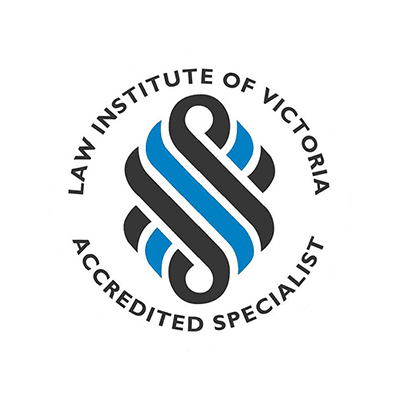Legal issues regarding Guardianship & Administration
A Guardian is a person who obtains legal authority to make personal lifestyle decisions for another person who has incapacity.
An Administrator is a person who obtains authority to make decisions about another person’s financial affairs, when that person has incapacity.
If a friend or loved one is no longer able to make reasonable personal decisions, then a friend can make an application to the Victorian Civil and Administrative Tribunal (VCAT) for an Order appointing a Guardian and/or Administrator for that person. You can plan and avoid VCAT determining who to appoint to make decisions on your behalf. As long as you are still competent, you can choose the person who will make decisions for you later on when you are unable to make those decisions yourself. You can do this by appointing an Enduring Guardian and an Attorney under an Enduring Power of Attorney.
APPOINTING AN ENDURING GUARDIAN
Appointing an Enduring Guardian allows you to choose the person who will make health and lifestyle decisions for you if you are no longer able to make decisions due to permanent or long term disability.
WHO CAN BE AN ENDURING GUARDIAN?
You can appoint any person to take an Enduring Guardian, as long as he is:
a) At least 18 years of age; and
b) Is not involved directly or indirectly in either a professional or an administrative capacity in your care or treatment or in providing accommodation to you (i.e.: an Enduring Guardian cannot be your treating doctor or manager of the nursing home you live in).
An Enduring Guardian has the power to make everyday health care decisions for you if you become unable to make reasonable decisions due to disability. You can specify: the kinds of decisions your Enduring Guardian can make; your views on what the decisions should be and what factors the Enduring Guardian should consider in making decisions.
If you do not specify the powers, an Enduring Guardian will have the same powers as a parent has in relation to their child, including the power to decide:
a) Where you should live and with whom;
b) Where you should work and in what capacity; and
c) To consent to health care that is in your best interests.
HOW DO YOU APPOINT AN ENDURING GUARDIAN?
You can appoint an Enduring Guardian by completing a legal document called “Appointment of Enduring Guardian”. To make the Appointment of Enduring Guardian effective it must be signed by the proposed Enduring Guardian, and witnessed by two other people, one of whom must be a person qualified to witness statutory declarations.
HOW DO YOU CHANGE AN ENDURING POWER OF GUARDIANSHIP?
If you are still mentally competent, you can cancel the appointment of an Enduring Guardian by completing a “Revocation of Appointment of Enduring Guardian”. If you are no longer mentally competent VCAT can cancel the appointment of an Enduring Guardian if:
a) The Enduring Guardian no longer wishes to act;
b) VCAT is satisfied the Enduring Guardian has not acted in your best interest.
If you sign a subsequent Enduring Power of Attorney, it automatically replaces the earlier one.
WHAT IF AN ENDURING GUARDIAN IS NOT APPOINTED?
If a friend or loved one has not appointed an Enduring Guardian and is no longer able to make reasonable personal decisions, then a friend can make an application to VCAT for an Order appointing a Guardian and/or Administrator for that person. When a Guardian and/or Administrator are appointed the person for whom the appointment is made is called “the Represented Person”.
Orders are tailor-made to suit the individual needs of each represented person and are designed to give as much independence as possible to the represented person.
Who is eligible to be a Guardian appointed by VCAT?
VCAT may appoint a person over 18 who consents to be Guardian where VCAT is satisfied that the person;
a) Will act in the best interests of the represented person;
b) Has no conflict of interest; and
c) The person is suitable to act as Guardian.
In determining whether a person is suitable, as a Guardian VCAT must take into account:
a) The wishes of the represented person;
b) The desirability of preserving existing family relationships;
c) The compatibility of the Guardian with the represented person and/or Administrator; and
d) The accessibility the represented person will have to the Guardian.
Where no other person is available, VCAT may appoint the Public Advocate who is a Government Appointee.
What are the powers and duties of a Guardian appointed by VCAT?
A plenary (or full) Guardian has the same powers over the represented person as if he or she were an Enduring Guardian that is as if he or she were a parent and the represented person was his/her child. A limited Guardian has the same powers as the plenary Guardian but is restricted by the terms of VCAT’s order.
A Guardian must act in the best interests of the represented person and if the Represented Person dies, the Guardian must report the death to VCAT. A Guardian may not give approval to sterilization, termination of pregnancy and donation of non-regenerative tissue without the approval of VCAT.
VCAT may appoint a person who consents to be an Administrator of an Estate if VCAT is satisfied that the person:
a) Will act in the best interests of the represented person;
b) Has no conflict of interest (e.g. conflicting financial interests);
c) Has sufficient expertise or has a special relationship with the represented person; and
d) Will be appropriate taking into account the wishes of the represented person and the compatibility of the Administrator with the Guardian.
VCAT may appoint the State Trustee or Public Advocate if it believes that it is appropriate to do so.
The powers of an Administrator are governed by the presumption that the Administrator will act in the best interests of the represented person and in a way to encourage and assist the represented person to become capable of administering his or her Estate. To make sure of honest management of the Estate an Administrator must lodge accounts annually with VCAT.
An Administrator’s powers are extensive and take effect as if the represented person undertook the action. Subject to VCAT’s discretion, the powers of an Administrator may include the general care, management, and administration of the Estate, and any action, which the represented person could have undertaken had the represented person not been under a legal disability.
There are also a number of specific powers, which VCAT may give to an Administrator. These powers allow an Administrator to:
- Collect income or compensation payable to the represented person;
- Grant or accept a surrender of a lease;
- Sell, exchange, mortgage or partition property;
- Pay debts of the Estate;
- Alter conditions of partnership on behalf of the represented person;
- Start or to defend legal proceedings on behalf of the represented person;
- Execute and sign any deeds and other documents;
- Pay any sum for the maintenance of the represented person.
The Administrator also has extensive powers of investment and holds the investments in the name of the represented person, namely to:
- Invest in specified securities, debentures, guaranteed loans, mortgages, bills of exchange;
- Purchase a residence for the represented person;
- Continue with existing investments;
- Deposit money with banks, building societies, short term money market dealers;
- Invest in any authorized trustee investment.
VCAT may allow the Administrator to invest in other securities not covered in the list set out above, or land, if VCAT decides that those investments are desirable for the benefit of the represented person, spouse, children, or other dependants.
The basic duty of an Administrator is to act in the best interest of the represented person and to manage the represented person’s financial affairs including the duty to make sure:
a) Action is taken on behalf of the Represented person in any legal proceeding;
b) The Represented Person’s tax is paid; and
c) Expenses relating to accommodation are met.
Once appointed, the Administrator must identify all income and assets belonging to the represented person. The assets include both real property e.g. land, and houses, and personal property e.g. Bank accounts, jewellery, and debts owed to the represented person. The income may include interest, dividends, superannuation benefits, or other income.
The next step for the Administrator is to develop a plan to show how he will manage the income and assets. The plan should include:
- Details of the income and source of income
- Details of assets
- Professionals required to be contacted
- Expenses e.g. lodging, medical, dental, taxes etc
- The records that are to be kept; and
- The investment strategy
As Administration is a legal appointment the Administrator will be held liable for consequential losses if he or she does not follow the terms of VCAT’s order, or if he or she acts illegally or negligently or if he or she conceals information or misrepresents facts to VCAT. If an Administrator is unsure of his or her legal liability, they should consult their legal adviser.
Powers of Attorney
The grant of Enduring Power of Attorney together with the grant of an Enduring Power of Guardianship is a preventative measure which will ensure that a relative, close friend or trusted adviser can manage a your affairs without having to obtain a guardianship or administration order.
These powers will avoid the need for a Guardian or Administration Order and allow you to determine who you want to manage your affairs and what powers you wish that person to have.
An Enduring Power of Attorney enables your attorney to make financial and business decisions on your behalf when you are incapable of managing your affairs. The Enduring Power of Guardianship authorizes your guardian to make health care and lifestyle decisions.
If there is a conflict between the decisions of an Enduring Guardian and an Attorney appointed under an Enduring Power of Attorney in relation to medical treatment or lifestyle issues, then the decision of the Enduring Guardian prevails.
There is also an overlap between the role of an Enduring Guardian and that of an attorney appointed under an Enduring Power of Attorney (Medical Treatment). An attorney has the power to consent to and refuse medical treatment on your behalf if you become incompetent. Unlike an Enduring Guardian, there is no restriction on who can be appointed as an attorney.
If there is a conflict between the decision of an Enduring Guardian and an attorney about a medical treatment issue, the decision is to be made by the attorney and not by the Enduring Guardian.
Given the overlap of powers between an Attorney under an Enduring Power of Attorney, an Enduring Guardian and an attorney under an Enduring Power of Attorney (Medical Treatment), it is important to carefully consider the person whom you wish to hold these positions. It may be better to appoint different people in each position or the same person to hold a number of positions.
NEED MORE INFORMATION
Behan Legal assists and advises on these important issues. For an appointment, call 03 9646 0344.


